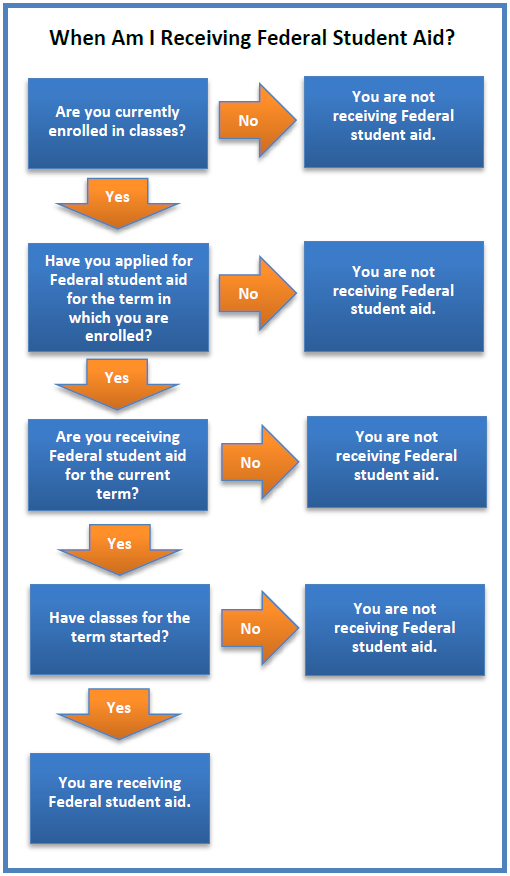
How do drug-related convictions affect my student loan eligibility?
In general, if you are convicted of a drug-related felony or misdemeanor that took place while you were receiving Federal student aid, you will become ineligible to receive further aid for a specified period of time upon conviction.
You can shorten this period of ineligibility by:
- Successfully completing an approved drug rehabilitation program that includes passing two unannounced drug tests, or
- Passing two unannounced drug tests administered by an approved drug rehabilitation program, or
- Having the conviction reversed, set aside, or otherwise rendered invalid.
How long am I ineligible to receive Title IV, HEA program funds (Federal student aid) if I don’t pursue early reinstatement of eligibility?
The length of time you are ineligible depends on the type and number of convictions you have had for drug-related offenses committed while you were receiving aid. The law recognizes two broad categories of drug offense: “possession of illegal drugs” and “sale of illegal drugs.” The table below lists the period of ineligibility by type and number of offenses.

If you do not wish to pursue early reinstatement of your eligibility for Federal student aid, you can calculate the date at which you would regain eligibility for Federal student assistance by completing the Student Aid Eligibility Worksheet, available at:
When am I considered to be ‘receiving aid’?
You are considered to be receiving aid beginning on the day that classes start for any term you have applied for, been approved for, and for which you have accepted an offer for Federal student aid.
Summer breaks do not count as time receiving aid if you are not enrolled in classes. However, holiday breaks during the academic year count as time enrolled.
The chart below will help clarify when you are considered to be receiving Federal student assistance.

What about convictions for offenses that took place when I was not receiving aid?
Convictions for a Federal or State drug offense (either sale or possession) count against a student for Title IV aid eligibility purposes only if they were for an offense that occurred during a period of enrollment for which the student was receiving Federal Student Aid. They do not count if the offense occurred during a period of enrollment when the student was not receiving Federal Student Aid.
This law applies to you only if you have been convicted of a drug-related offense.
What is an approved drug rehabilitation program?
An acceptable drug rehabilitation program must Include two unannounced drug tests AND meet at least one of the following requirements.
The program must be:
- Qualified to receive funds directly or indirectly from a Federal, State, or local government program.
- Qualified to receive payment directly or indirectly from a Federally or State-licensed insurance company.
- Administered or recognized by a Federal, State, or local government agency or court.
- Administered or recognized by a Federally or State-licensed hospital, health clinic, or medical doctor.
NOTE: Not all programs include unannounced drug testing as part of treatment. When contacting a program about possible admission, you should explain the drug testing requirement and ask if the program can provide the required unannounced tests.
Where can I find an approved treatment program?
The Substance Abuse and Mental Health Services Administration (SAMHSA) Treatment Locator lists treatment programs that receive Federal funds. Programs on this list are approved, provided they offer two unannounced drug tests:
How can I get the required drug tests without enrolling in treatment?
Generally, drug rehabilitation programs do not provide drug tests to individuals whom they have not admitted to treatment. To meet the drug testing requirement without taking part in treatment, you will need to make arrangements with an approved drug rehabilitation program.
Are there other laws related to drugs that can make me ineligible for Title IV, HEA program assistance?
The Anti-Drug Abuse Act of 1988 includes provisions that authorize Federal and State judges to deny certain Federal benefits — including Title IV, HEA student aid – to persons convicted of drug trafficking or possession. The Department of Education maintains a list within the Central Processing System (provided by the Department of Justice) against which all FAFSA applicants are matched. Applicants on the DOJ Drug Abuse Hold list are notified that they are not eligible for Title IV, HEA funds and told whom they can contact if they have questions.
What if I already completed a treatment program that did not include unannounced drug tests or recovered through mutual aid meetings such as Narcotics Anonymous or SMART Recovery?
That does not meet the requirements of the law. To meet the requirements of the law and regain eligibility for Federal student aid, you must either successfully complete an acceptable drug rehabilitation program that includes two unannounced drug tests or successfully pass two unannounced drug tests at an acceptable drug rehabilitation facility after the date of your conviction.
How do I document successful completion of the treatment or drug testing requirements?
Your financial aid office will make this determination. You may be required to provide written documentation.
What if I have other questions?
For more information, please call the Federal Student Aid Information Center at 1-800-4-FED-AID (1-800-433-3243). Additional information may also be found here: https://studentaid.gov/understand-aid/eligibility/requirements/criminal-convictions#drug-convictions


